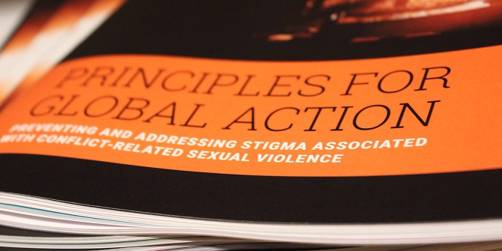
On 25 September, the LSE Centre for Women, Peace and Security held a workshop on the issue of Stigma and Children Born of War. The workshop aimed to facilitate knowledge exchange, critical reflection and dialogue between academics, policymakers and civil society.
Concept note
A major gendered consequence of sexual violence in conflict for women is childbirth resulting from diverse forms of conflict-rape and sexual exploitation. The traumatic way in which some children come into being may present enduring challenges for children, their mothers and communities. Due to perceived association with an “enemy” or “foreign” father, some children may experience stigma from birth. As they grow up in “post-conflict” environments, stigma experienced by children and often their mothers, may intersect with other vulnerabilities, obstructing their human rights and life chances.
Over the last decade or so, researchers in the field of “children born of war” have criticised the lack of systematic international policy focus and design for this category of victim-survivor (Mochmann 2008; Carpenter 2010). Concerns about intergenerational stigma were a key motivation for the emergence of this field, whose boundaries are contested. While empirical data is incomplete, evidence of stigma-related risks for at least some children includes: infanticide, contested citizenship, statelessness, poverty, sexual exploitation and intersectional discrimination. Factors which may influence family and societal acceptance or rejection of children remain unclear.
Children born of war continue to emerge in sporadic and incidental ways across international fora and media reporting. For example, girls and women are returning to communities with children conceived through rape in captivity by the Lord’s Resistance Army, Boko Haram and ISIS. The former LRA Commander, Dominic Ongwen, is being prosecuted before the ICC in an historic forced pregnancy trial, and now adult victim-survivors seek reparations in Bosnia, Rwanda and Kosovo.
Clearly, the lives and complex needs of these children are not reducible to a single policy agenda, legal or conceptual framework. However, the piecemeal way in which they are emerging across policy agendas and academic discourse may itself be problematic and potentially stigmatizing. Their situation, “categorization” and the potential impact of intergenerational stigma warrants more holistic consideration.
The launch of the UK’s Principles for Global Action to Prevent and Address Stigma Associated With Conflict-Related Sexual Violence, which is part of the UK’s Preventing Sexual Violence in Conflict agenda, and growing research on children born of war presents a critical opportunity to bridge the academic-policy gap on the subject of stigma and children born of war.
Read more about the UK's Principles for Global Action in a blog post by Joanne Neenan for the LSE WPS blog.





